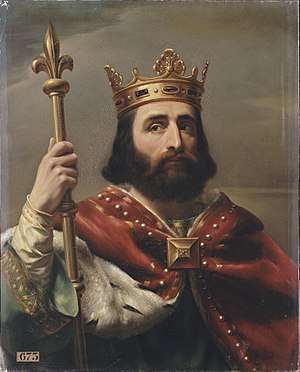751
Year 751 (DCCLI) was a common year starting on Friday (link will display the full calendar) of the Julian calendar. The denomination 751 for this year has been used since the early medieval period, when the Anno Domini calendar era became the prevalent method in Europe for naming years.
| Millennium: | 1st millennium |
|---|---|
| Centuries: | |
| Decades: | |
| Years: |
|
| 751 by topic |
|---|
| Leaders |
| Categories |
|
| Gregorian calendar | 751 DCCLI |
| Ab urbe condita | 1504 |
| Armenian calendar | 200 ԹՎ Մ |
| Assyrian calendar | 5501 |
| Balinese saka calendar | 672–673 |
| Bengali calendar | 158 |
| Berber calendar | 1701 |
| Buddhist calendar | 1295 |
| Burmese calendar | 113 |
| Byzantine calendar | 6259–6260 |
| Chinese calendar | 庚寅年 (Metal Tiger) 3447 or 3387 — to — 辛卯年 (Metal Rabbit) 3448 or 3388 |
| Coptic calendar | 467–468 |
| Discordian calendar | 1917 |
| Ethiopian calendar | 743–744 |
| Hebrew calendar | 4511–4512 |
| Hindu calendars | |
| - Vikram Samvat | 807–808 |
| - Shaka Samvat | 672–673 |
| - Kali Yuga | 3851–3852 |
| Holocene calendar | 10751 |
| Iranian calendar | 129–130 |
| Islamic calendar | 133–134 |
| Japanese calendar | Tenpyō-shōhō 3 (天平勝宝3年) |
| Javanese calendar | 645–646 |
| Julian calendar | 751 DCCLI |
| Korean calendar | 3084 |
| Minguo calendar | 1161 before ROC 民前1161年 |
| Nanakshahi calendar | −717 |
| Seleucid era | 1062/1063 AG |
| Thai solar calendar | 1293–1294 |
| Tibetan calendar | 阳金虎年 (male Iron-Tiger) 877 or 496 or −276 — to — 阴金兔年 (female Iron-Rabbit) 878 or 497 or −275 |

King Pepin III (the Short) (751–768)
Events
By place
Byzantine Empire
- June – Leo IV, son of Emperor Constantine V, is crowned co-emperor at Constantinople. Only a year or so after his mother Irene died, Constantine's second wife Maria dies, at approximately the same time as Leo's coronation.
Europe
- November – Pepin the Short, youngest son of Charles Martel, forces King Childeric III to retire to the monastery of Saint-Bertin. He proclaims himself as king of the Franks with the support of Pope Zachary, and is crowned at Soissons by Boniface, bishop of Mainz. Pepin becomes as Pepin III the first Carolingian monarch of the Frankish Kingdom.[1]
- King Aistulf of the Lombards captures Ravenna and the Romagna, ending the Byzantine Exarchate of Ravenna. The last exarch Eutychius is killed by the Lombards. Aistulf threatens Rome, claiming a capitation tax. Pope Zachary, alarmed, appeals for aid from the Byzantine Empire, but his request is declined.
Abbasid Caliphate
- Battle of Talas: First recorded encounter (and the last) between Arab and Chinese forces. The rulers of Tashkent and Ferghana are both nominal vassals of the Tang Dynasty; the Chinese have intervened on behalf of Ferghana in a conflict between the two; the Abbasid Caliphate, competing with the Chinese for control of Central Asia, has become involved. Arab forces from Samarkand have marched to challenge a Chinese army (30,000 men) under Gao Xianzhi. Gao has had a series of military victories in the region, but his Turkish contingent, Karluk mercenaries, defects. Out of 10,000 Tang troops, only 2,000 manage to return from the Talas River to China. The Arabs triumph, and they will remain the dominant force in Transoxiana for the next 150 years.
- Muslim introduction of papermaking: The first paper mill in the Islamic world begins production at Samarkand. Captured craftsmen, taken at the Battle of Talas River, have by some accounts revealed the technique of papermaking (although paper may have arrived from China much earlier via the Silk Road). Arab scholars will use paper to produce translations of Ancient Greek and Roman writings.
Asia
By topic
Religion
- Kim Daeseong, chief minister of Silla, orders the construction of the Bulguksa and Seokguram temples at Gyeongju (South Korea).
- The oldest surviving printed document, a Buddhist scripture, is printed in Korea.
- Theodore succeeds Theophylact as Orthodox Patriarch of Antioch.
- The Great Buddha at Tōdai-ji in Nara (Japan) is completed.
Births
- June 28 – Carloman I, king of the Franks (d. 771)
- Adalard of Corbie, Frankish abbot (approximate date)
- Meng Jiao, Chinese poet (d. 814)
Deaths
- June – Maria, Byzantine empress
- Childebrand I, duke of Burgundy (b. 678)
- Eutychius, Byzantine exarch of Ravenna
- Fergus mac Fogartaig, king of Brega (Ireland)
- Gisulf II, duke of Benevento (approximate date)
- Mansur ibn Jumhur al-Kalbi, Arab governor of Sindh
- Taki, Japanese princess and saiō
gollark: Allegedly.
gollark: I believe they should be treated as remy.
gollark: <#788783512685248522>
gollark: What do you want us to do, CATEGORIZE the channels‽
gollark: "Trash"? Bee you!
References
- Pierre Riché, The Carolingians: A Family Who Forged Europe (Philadelphia, 1993), p. 65.
This article is issued from Wikipedia. The text is licensed under Creative Commons - Attribution - Sharealike. Additional terms may apply for the media files.